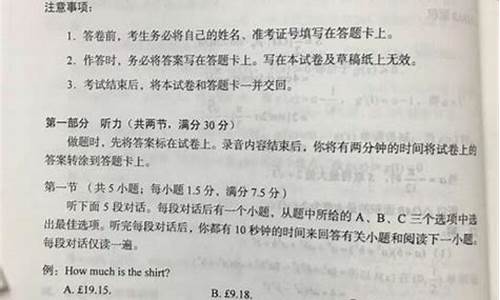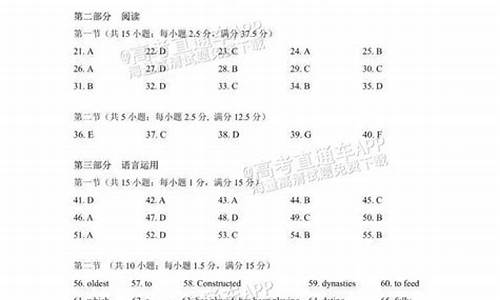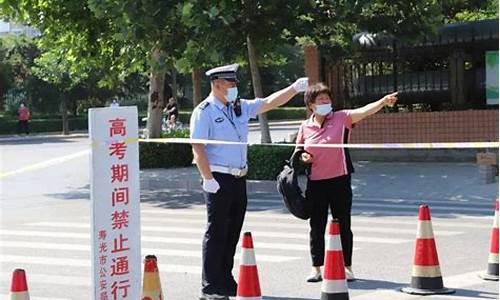您现在的位置是: 首页 > 教育分析 教育分析
2017高考b卷英语,2017英语高考题
tamoadmin 2024-06-04 人已围观
简介1.2017年高考英语备考:关系代词副词的区别 英语作为我们的第二门语言,在高考会怎么考核考生呢?有哪些英语知识点,下面是我为大家整理的关于江苏高考英语知识点,希望对您有所帮助。欢迎大家阅读参考学习! 江苏高考英语知识点 S+V(是系动词)+ P 1. This │is │an English-Chinese dictionary. 2. The dinner │smell
1.2017年高考英语备考:关系代词副词的区别

英语作为我们的第二门语言,在高考会怎么考核考生呢?有哪些英语知识点,下面是我为大家整理的关于江苏高考英语知识点,希望对您有所帮助。欢迎大家阅读参考学习!
江苏高考英语知识点
S+V(是系动词)+ P
1. This │is │an English-Chinese dictionary.
2. The dinner │smells │good.
3. He │fell │in love.
4. Everything │looks │different.
5. He │is growing │tall and strong.
6. The trouble │is │that they are short of money.
7. Our well │has gone │dry.
8. His face │turned │red.
附:
联系动词(Link Verb)本身有词义,但不能单独用作谓语,后边必须跟表语(亦称补语),构成系表结构说明主语的状况、性质、特征等情况。
有些系动词又是实义动词,该动词表达实义时,有词义,可单独作谓语,例如:
He fell ill yesterday.他昨天病了。(fell是系动词,后跟补足语,说明主语情况。)
He fell off the ladder. 他从梯子上摔下来。fell是实义动词,单独作谓语。
1)状态系动词
用来表示主语状态,只有be一词,例如:
He is a teacher. 他是一名教师。(is与补足语一起说明主语的身份。)
2)持续系动词
用来表示主语继续或保持一种状况或态度,主要有keep, rest, remain, stay, lie, stand, 例如:
He always kept silent at meeting. 他开会时总保持沉默。
This matter rests a mystery. 此事仍是一个谜。
3)表像系动词
用来表示"看起来像"这一概念,主要有seem, appear, look, 例如:
He looks tired. 他看起来很累。
He seems (to be) very sad. 他看起来很伤心。
4)感官系动词
感官系动词主要有feel, smell, sound, taste, 例如:
This kind of cloth feels very soft. 这种布手感很软。
This flower smells very sweet. 这朵花闻起来很香。
5)变化系动词
这些系动词表示主语变成什么样,变化系动词主要有become, grow, turn, fall, get, go, come, run.
He became mad after that. 自那之后,他疯了。
She grew rich within a short time. 她没多长时间就富了。
6)终止系动词
表示主语已终止动作,主要有prove, turn out, 表达"证实","变成"之意,例如:
The rumor proved false.这谣言证实有假。
The search proved difficult.搜查证实很难。
His plan turned out a success. 他的计划终于成功了。(turn out表终止性结果)
高考 英语 作文 必考考点
1.经济的快速发展 the rapid development of economy
2.人民生活水平的显著提高/ 稳步增长the remarkable improvement/ steady growth of people’s living standard
3.先进的科学技术 advanced science and technology
4.面临新的机遇和挑战 be faced with new opportunities and challenges
5.人们普遍认为 It is commonly believed/ recognized that…
6.社会发展的必然结果 the inevitable result of social development
7.引起了广泛的公众关注 arouse wide public concern/ draw public attention
8.不可否认 It is undeniable that…/ There is no denying that…
9.热烈的讨论/ 争论 a heated discussion/ debate
10. 有争议性的问题 a controversial issue
11.完全不同的观点 a totally different argument
12.一些人 …而另外一些人 … Some people… while others…
高中英语易错点归纳
1.在你离开之前,有些事应该要告诉你。(ought to;there be)
学生错例:
1)Before you leave, there are somethings I ought to tell you.(受中文“些”字意思影 响,误把单数的something 当somethings)
2)Before you leave,there are some things ought to tell you.
(误用something; 句子 成分残缺,从句漏了主语 I)
3)There are something that ought to tell you before you leave.
4)There is something ought to tell you before you leaving.(受中文“在”影响,误用了“leaving”)
2.我很难把学习和兴趣结合起来。(combine...with...)
学生错例:
1)I'm difficult to combine study with interest.(典型的中文翻译思维,与地道的英语表达有较大差别)
2) I hardly combining study with interest.(中式英语)
3)It's hardly that combine study with interest.(乱套句型)
4)I hardly combine study with interest.(照字翻译)
高考英语语法考点一
1. 语态和时态
—Do you see those people on the little sandy island?
—Yes, they _______ handkerchiefs for the last half hour. I wonder why.
A. were waving B. waved C. had waved D. have been waving
正确答案D
高考考点考查动词时态。现在完成进行时:表示一个从过去某一时刻开始的动作,一直延续到说话时还在进行或刚结束,句中常出现用for, since, how long等引导的时间状语。e.g. His telephone has been ringing for a long time.e.g. It has been raining since last Sunday. e.g. How long have you been wearing glasses?
题干句意“你有没有看见那些在小岛上的人?”“是的,我看见了。他们在过去的半小时里一直在挥手帕,我不知道为什么。”
详细解析这个挥手帕的动作是在半小时前开始的,然后一直在挥,一直挥到了说话的这个时候,所以我们用的是一个现在完成进行时,强调一个动作的持续。我们再来看一下其他几个时态:
A选项是were waving——过去进行时,它指的是:①过去某一时刻正在进行;②过去某一阶段正在进行;B. waved——过去时,过去某时间发生的且已完成的动作,所以我们知道A和B这两个时态都是和过去有关,而和现在是没有一点关系的,所以A和B这两个答案错了。
C. had waved——过去完成时:过去某一时刻或某一动作前完成的动作或状态,那么它所表达的时候是在过去的过去,例如:e.g. By the end of last year, we had built 5 new schools.到去年年底为止,我们已经建造了5所学校。首先,过去的时间是去年年底;而句子表达的意思是在去年年底之前,所以我们用过去完成时——had build.和现在是更加没有联系了,所以这个答案也是不正确的。
题干中的时间状语是“for the last half hour”,注意这个last不是指“最后的”,而是指“刚才的——在刚才的半个小时里”,那么往往呢句中出现last,或者是last half hour、recent这种词的话,我们一般都会选择现在完成进行时,因为它指的是“刚才”,那么肯定指“从刚才到现在”。所以本题答案是D.
高考英语语法考点二
名词性从句
The information could be helpful to ____will take over the job.
A. those B. who C. whoever D. anyone
正确答案C
高考考点考查名词性从句,顾名思义就是名词,它可充当主语、表语、宾语和同位语,所以相应的名词性从句也分为有主语从句、表语从句、宾语从句和同位语从句。此题考的就是介词to后的宾语从句。
题干句意“这个消息可能会对任何将接管这个工作的人有所帮助。”whoever = anyone who“任何怎么怎么样的人”所以这个答案是正确的。我们再来看其他几个答案为什么不对呢?
详细解析A选项是those,如果those填在这里的话就会变成缺少关系代词who,如选those,那those will take over the job“那些人将会取代这个工作”,它就变成了一个独立的句子,而不是一个从句,更加就不是一个宾语从句了,所以从原则上说它是错误的,那么怎样改才是正确的呢?很简单,只要在这个those的后面加一个关系代词who,把它变成一个定语从句——those who will take over the job,“那些将要接管这个工作的人”,那么这样就可以了。
B选项是who在名词性从句中表示疑问,e.g. Who will take over the job has not been decided yet. D选项是anyone,错误的原因也是缺少关系代词who.
比较those who和anyone who,前者是“那些……的人”,后者表示“任何……的人”。区别就是在于those who是一个复数的概念,“那些人”,后面的谓语动词要用复数;而anyone who是表示任何一个人,后面要用单数的谓语动词。
高考英语语法考点三
虚拟语气和情态动词
—David, we went to Lake Geneva for the weekend.
—That _______ a very nice change. I wish I had gone there.
A. must be B. must have been C. could be D. could have been
正确答案B
高考考点考查情态动词。
首先A和B里面都有must,must表推测,它表示“肯定…”,这个语气是非常确定的,百分之百的;那么当must表推测的时候呢,它还可以表示不同的时间,例如:
第一,must be表示的是“现在的状态”,He must be a teacher. 他肯定是一个老师。
第二,must be doing表示“现在进行的动作”,They must be having a meeting in the office.他们现在肯定正在办公室里开会。
第三,must have done表示“过去发生的事情”,You must have met him yesterday.你昨天肯定见过他了。让我们看一下将“must have been”填到题干里面是否正确?句意:“David,我们周末去了日内瓦湖。”“哦,那肯定是一个非常好的改变,我希望我也去那里了。”这里是表示一个肯定的推测;又因为是上个周末的事情,说明这件事情已经发生了,我们所以用B. must have been,而不是A。
详细解析C选项是could轻微的怀疑或委婉的陈述看法,“可能”e.g. His story could be true, but I hardly think it is.他所说的这个 故事 可能是真的,但是我基本上不相信。
D选项是could have done虚拟语气,某事过去有可能发生而实际没有,“本来可以”,表示惋惜、遗憾 e.g. The accident could have been prevented.这个车祸原本是可以避免的。e.g. You could have done better, but you didn’t try your best.你原本是可以做的更好的,但是你并没有尽自己最大的努力。
江苏高考英语知识点相关 文章 :
★ 江苏高考英语作文预测
★ 2017江苏高考英语作文模板
★ 2017江苏卷高考英语作文素材
★ 2017江苏高考英语作文题目预测
★ 2017高考英语作文江苏
★ 2017年江苏高考英语完形填空专题提升训练题附答案
★ 2018年江苏省高考英语作文(2)
★ 2017江苏省高考英语作文怎么写
★ 2015年江苏高考英语作文范文
2017年高考英语备考:关系代词副词的区别
高考英语词汇详解:arrange的用法
1. 表示“安排”,注意以下用法:
①用作及物动词。如:
a) 用名词或代词作宾语。如:
We will arrange everything. 你们会安排好一切的。
I’ve arranged a taxi for you. 我已为你们安排了一辆出租车。
有时用于被动语态。如:
It is all arranged. 这事全都安排好了。
b) 用不定式作宾语。如:
They arranged to start early. 他们计划一早出发。
I’ve arranged to see them tonight. 我已安排今晚同他们见面。
We still have to arrange how to go there. 我们还得安排如何去那儿。
表示“安排某人做某事”,不能用 arrange sb to do sth, 而应用 arrange for sb to do sth 。
c) 用 that 从句作宾语。如:
We have arranged that she look after the children. 我们已安排她照看孩子。
They arranged that the meeting be put off to Saturday. 他们安排把会议推迟到星期六。
d) 不接双宾语。如:
请给我们安排一次与工人的会见。
正:Please arrange an interview with the workers for us.
误:Please arrange us an interview with the workers.
②用作不及物动词。如:
We must arrange about that. 我们须对此事作出安排。
Call up and arrange a taxi,please. 请打电话安排一辆出租车。
Let’s go and arrange with them about it. 我们去和他们把这事安排一下。
Let’s try and arrange so that we can get there in time. 我们设法安排一下,以便能及时赶到。
用作不及物动词时,还通常用于 arrange for sb to do sth。如:
He’s arranged for me to attend the meeting. 他已安排我去参加会议。
We have arranged for the car to come at nine. 我们已安排好让汽车9点钟来。
比较以下同义句型。如:
我们安排把会议推迟一周后召开。
正:We arranged for the meeting to be put off for a week.
正:We arranged that the meeting be put off for a week.
2. 表示“整理”、“排列”,是及物动词。如:
They were arranged in kinds . 他们是按种类排列的。
We must arrange the room before the guests arrive. 在客人到来之前我们必须把房间整理好。
一、 关系代词和关系副词的区别
1、关系代词(that, who, whom, whose, which)所代替的先行词是人或物的名词或代词,并在句中充当主语、宾语、定语等成分。
例1. Is he the man who/that wants to see you?(who / that在从句中作主语,指人)
例2. He is the man whom/ that I saw yesterday.(whom / that在从句中作宾语,指人)
例3. They rushed over to help the man whose car had broken down.(whose在句中作定语,指人)
例4. Please pass me the book whose (of which) cover is green.(whose在句中作定语,指物。若指物,它还可以同of which互换)
例5. The package (which / that) you are carrying is about to come unwrapped. 你拿的包快散了。(which / that在句中作carry的宾语,指物)
2、关系副词(when, where, why, that)可代替的先行词是时间、地点或理由的名词,在从句中作状语。关系副词when, where, why的含义相当于"介词+ which"结构,因此常常和"介词+ which"结构交替使用。
例6. Beijing is the place where (in which) I was born.
例7. Is this the reason why (for which) he refused our offer?
例8. His father died the year (that / when / in which) he was born.
例9. He can’t find the place (that / where / in which) he lived forty years ago.
二、 判断用关系代词和关系副词
方法1: 用关系代词,还是关系副词完全取决于从句中的谓语动词。及物动词后面无宾语,就必须要求用关系代词;而不及物动词则要求用关系副词。请改错:
1. This is the mountain village where I visited last year.
2. I will never forget the days when I spent in the countryside.
习惯上总把表地点或时间的名词与关系副词 where, when联系在一起。此两题错在关系词的误用上。句1和句2的where, when都应改为which.。
方法2: 准确判断先行词在定语从句中的成分(主、谓、宾、定、状),根据第一点(区别),也能正确选择出关系代词/关系副词。
例10.This museum is ___ you visited a few days age?
A. where B. that C. on which D. the one
例11. This is the museum ____ the exhibition was held.
A. where B. that C. on which D. the one (答案:例1 D,例2 A)
在例10中,所缺部分为宾语,而where, that, on which都不能起到宾语的作用,只有the one既做了主句的表语,又可做从句的宾语,可以省略关系代词,所以应选D。
而例11中, 主、谓、宾俱全,从句部分为句子的状语表地点,既可用副词where,又因 in the museum词组,可用介词in + which 引导地点状语。而此题中,介词on 用的不对,所以选A。
关系词的选择依据在从句中所做的成分,先行词在从句中做主、定、宾语时,选择关系代词 (who, whom, that, which, whose); 先行词在从句中做状语时,应选择关系副词 ( where 地点状语,when 时间状语,why 原因状语)。
方法3:当先行词是all, everything, anything, nothing,the one, much, few, any, little等,或先行词是形容词级时,或在there be 句型中,或当先行行词既有人又有物时,关系代词用that, 而不用which。
例12. Finally, the thief handed everything that he had stolen to the police.
例13. The soldiers and their guns that we sent to the front were lost.
方法4:在引导非限定性定语从句时,和在介词后不能用that,应用which。
例14.(错) The tree, that (改为which)is four hundred years old, is very famous here.
例15.We depend on the land from which we get our food.
下一篇:云南高考志愿表格,云南高考志愿表









